Gastric Sleeve Surgery: What to Expect During and After the Procedure?
Weight Loss Surgery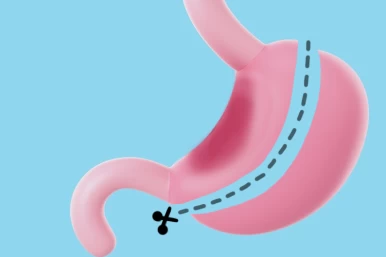
stric sleeve surgery, also known as sleeve gastrectomy, is a surgical weight loss procedure that reduces the size of the stomach to promote significant weight loss. During the surgery, a large portion of the stomach is removed, leaving behind a smaller, banana-shaped pouch that restricts the amount of food a person can eat.
The procedure is typically performed laparoscopically, using small incisions and a camera for precise visualization. This minimally invasive approach results in faster recovery times, reduced pain, and fewer complications compared to traditional open surgery.
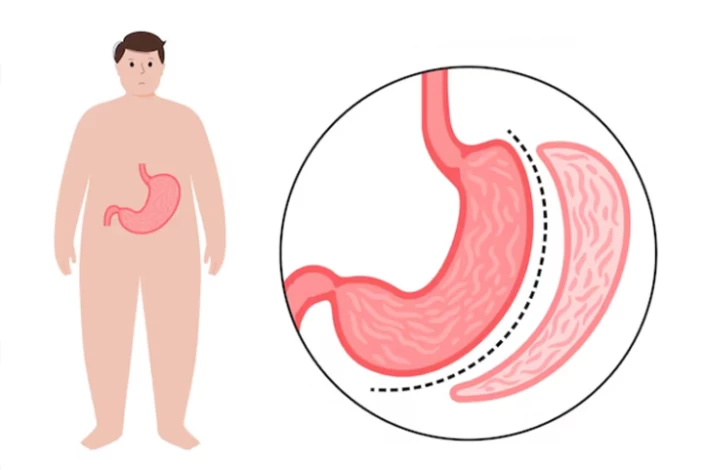
Patients can expect to see significant weight loss within the first year after undergoing gastric sleeve surgery, often reaching their desired weight within 12-18 months. To ensure long-term success, patients must adhere to a strict postoperative diet and exercise plan, attend regular follow-up appointments with their plastic surgeon, and address any emotional or psychological factors that may impact their weight loss journey.
While risks and potential complications exist, as with any surgery, the benefits of gastric sleeve surgery in terms of improved health, quality of life, and long-term weight loss make it a valuable option for individuals struggling with obesity.
In this article, we will explore the intricacies of gastric sleeve surgery, including its procedure, candidates, pre-operative preparation, postoperative care, potential complications, and expected outcomes.
What Is the Gastric Sleeve Surgery?
Gastric sleeve surgery, also known as sleeve gastrectomy, is considered a safe and effective treatment option for individuals with high body mass index (BMI) who have not achieved significant weight loss through diet, exercise, or other non-surgical methods.
Gastric sleeve surgery is a minimally invasive bariatric procedure. During it, the surgeon removes approximately 75-85% of the stomach, leaving behind a narrow sleeve that can hold significantly less food than the original stomach. By reducing the stomach's capacity, gastric sleeve surgery helps patients feel full faster and stay satisfied for longer periods, ultimately aiding in weight loss efforts.
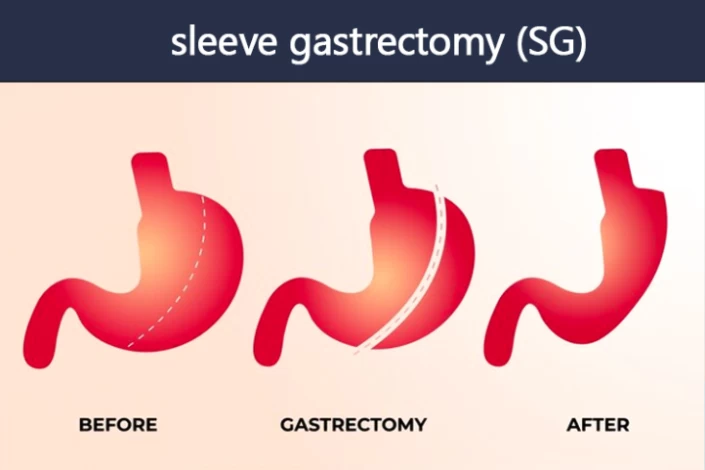
How Common Is Gastric Sleeve Surgery?
Gastric sleeve surgery has become increasingly common in recent years as a popular bariatric procedure for weight loss.
According to data from the American Society for Metabolic and Bariatric Surgery (ASMBS), gastric sleeve surgery has surpassed gastric bypass as the most commonly performed bariatric procedure in the United States. Approximately 150,000 gastric sleeve procedures are performed annually in the United States and 380,000 globally.
What Medical Conditions Can Gastric Sleeve Treat?
Sleeve gastrectomy is primarily performed to aid in weight loss for individuals with obesity. However, this bariatric surgery has been found to effectively treat or improve various obesity-related medical conditions, including:
- Type 2 diabetes;
- High blood pressure (hypertension);
- Sleep apnea;
- High cholesterol;
- Gastroesophageal reflux disease (GERD);
- Non-alcoholic fatty liver disease (NAFLD);
- Polycystic ovary syndrome (PCOS);
- Osteoarthritis;
- Heart disease;
- Stroke.
Is the Gastric Sleeve Safe?
Gastric sleeve surgery is generally considered safe when performed by experienced and qualified surgeons in appropriate medical facilities. The risks associated with it are significantly lower than those associated with obesity and obesity-related health conditions.
In addition, gastric sleeve surgery has lower complication rates than other common procedures, such as gallbladder removal and hip replacement. The majority of gastric sleeve surgeries are conducted using minimally invasive techniques, which reduce pain from incisions and speed up recovery.
Who Are Candidates for Gastric Sleeve Surgery?
Candidates for sleeve gastrectomy typically include individuals who:
- Have a body mass index (BMI) of 40 or higher, or a BMI of 35 with obesity-related health conditions such as type 2 diabetes, high blood pressure, or sleep apnea;
- Have tried and failed to lose weight through diet and exercise alone;
- Are committed to making long-term lifestyle changes, including adopting a healthy diet and regular physical activity;
- Are not excessively dependent on alcohol or drugs;
- Are physically and mentally prepared for the procedure.
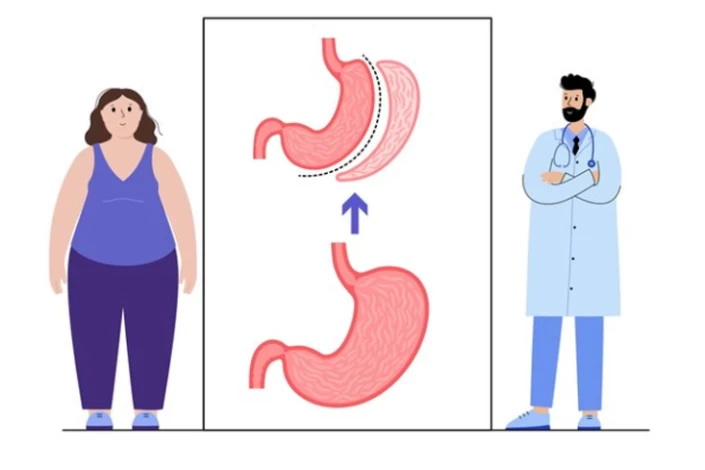
What Occurs Before Gastric Sleeve Surgery?
Before undergoing gastric sleeve surgery, individuals undergo a thorough evaluation process to assess their readiness for the procedure. This evaluation often begins with an initial consultation with a bariatric surgeon, during which the patient's medical history, weight loss goals, and motivations for surgery are discussed. A physical examination is then conducted to evaluate the patient's overall health and identify any potential risk factors.
In the weeks before the surgery, patients will be required to follow a pre-operative diet to help shrink their livers and reduce the risk of complications. This diet typically consists of low-calorie, high-protein liquids and excludes foods that may contribute to liver enlargement.
Patients are also instructed to refrain from eating or drinking for at least 12 hours before the procedure. This precaution ensures that the stomach is empty during surgery, reducing the risk of complications. Having food or liquid in the stomach during surgery could lead to uncomfortable or potentially dangerous gastric sleeve side effects.
How Does the Gastric Sleeve Work?
The gastric sleeve is a surgical weight loss procedure that involves removing a large portion of the stomach, leaving behind a smaller, banana-shaped sleeve or pouch. By reducing the size of the stomach, the gastric sleeve limits the amount of food that can be consumed at one time. This restriction helps individuals feel full more quickly and consume fewer calories.
During the gastric sleeve, the patient is placed under general anesthesia to ensure they are unconscious and pain-free throughout the procedure. Then, the surgeon makes several small incisions in the abdomen to access the stomach. This is typically done laparoscopically, using specialized surgical instruments and a tiny camera (laparoscope) inserted through the incisions.
Using a stapling device, approximately 75-85% of the stomach is removed along the greater curvature. The remaining portion is stapled closed, creating a smaller stomach pouch like a narrow sleeve. The removed portion is carefully extracted from the body through one of the incisions. Finally, the incisions in the abdomen are closed with sutures or surgical staples.
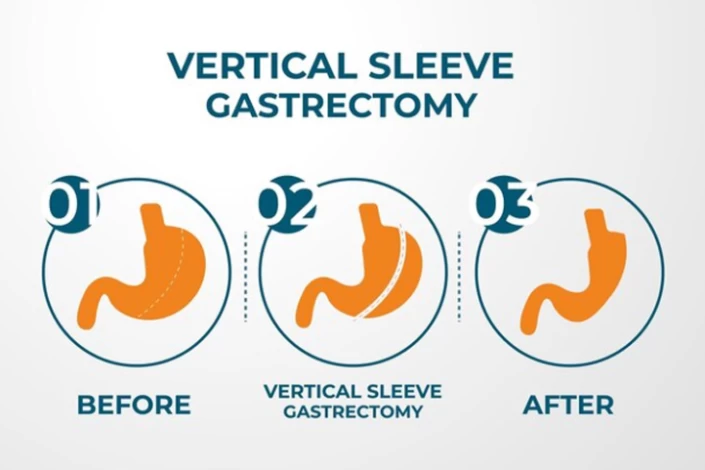
How Long Does Gastric Sleeve Last?
The duration of the sleeve gastrectomy can vary depending on factors such as the surgeon's experience, the patient's specific anatomy, and any potential complications that may arise during the procedure. However, it typically takes around 1 to 2 hours to perform. After the surgery, patients are usually monitored in the recovery room for a few hours before being transferred to a hospital room or discharged home, depending on their recovery progress.
What Happens After Gastric Sleeve?
Most patients will spend a day or two in the hospital following the gastric sleeve weight loss surgery to monitor their recovery and ensure there are no immediate complications. If you want more information about the gastric sleeve surgery recovery period, follow this article.
Should I Follow a Diet after Gastric Sleeve Surgery?
Following a specific diet plan after gastric sleeve surgery is essential for a successful recovery, optimal weight loss, and overall health. The post-operative diet plan typically progresses through several stages, starting with clear liquids, then moving on to pureed foods, soft foods, and eventually solid foods. This gradual progression allows the stomach to heal properly and adjust to its new size.
The gastric sleeve diet typically focuses on consuming small, nutrient-dense meals that are high in protein and low in carbohydrates and fats. It is important to eat slowly, chew food thoroughly, and avoid drinking liquids with meals to prevent discomfort and ensure proper digestion.
What Are the Potential Risks or Complications of Gastric Sleeve Surgery?
While the gastric sleeve procedure offers numerous benefits for obese individuals, there are also some potential disadvantages and risks associated with this weight loss surgery.
- Infection;
- Bleeding;
- Lung or breathing problems;
- Blood clots;
- Adverse reactions to anesthesia;
- Leaks or other complications at the site where the stomach was stapled or sealed during the surgery.

How Much Weight Can I Expect to Lose After Gastric Sleeve Surgery?
On average, patients can expect to lose about 60-70% of their excess body weight within the first 12-18 months after surgery. Excess body weight is the amount above a person's ideal or healthy weight based on their height.
For example, if a person is 100 pounds above their ideal weight before surgery, they may expect to lose around 60-70 pounds within the first year and a half after gastric sleeve surgery. Some patients may experience even greater weight loss, while others may lose slightly less. Factors that can influence weight loss outcomes include adherence to post-operative guidelines, dietary and lifestyle changes, exercise habits, overall health, and individual metabolism.
What Is the Gastric Sleeve Surgery Success Rate?
The success rate of gastric sleeve is about 80-90%. Studies have shown that most patients who undergo gastric sleeve surgery can expect to lose a significant amount of excess weight, typically around 60-70%, within the first year following surgery. Many patients also experience improvements in obesity-related health conditions such as type 2 diabetes, high blood pressure, and sleep apnea.
When the Gastric Sleeve Weight Loss Surgery Does Not Work?
While gastric sleeve surgery is generally considered an effective weight-loss procedure, there are instances where it may not lead to the desired outcomes. Some reasons why gastric sleeve surgery may not work as expected include:
- Inadequate lifestyle changes, including adopting a healthy diet, regular exercise, and behavior modification;
- Medical conditions that can affect weight loss post-surgery;
- Emotional eating, stress, anxiety, or other psychological factors can hinder weight loss progress.
How Much Does the Gastric Sleeve Cost in Iran?
The cost of gastric sleeve surgery in Iran can vary depending on several factors, including the specific hospital or healthcare facility, the surgeon's experience, the level of care provided, and any additional services or amenities included in the package. On average, the cost ranges from $3,500 to $5,000.
Why Gastric Sleeve Surgery in Iran?
Iran's reputation as a medical tourism destination has grown in recent years. Many international patients choose to travel to the country for various medical procedures, including gastric sleeve surgery. The availability of English-speaking surgeons and support staff in Iranian hospitals makes it easier for foreign patients to communicate and navigate the healthcare system during their treatment.
Iranian hospitals and healthcare facilities are equipped with state-of-the-art technology and staffed by skilled surgeons who specialize in bariatric procedures. Patients considering bariatric surgery can benefit from the expertise and resources available in Iranian healthcare facilities while experiencing the country's cultural richness and hospitality.
Additionally, gastric sleeve surgery in Iran is often more affordable than in many Western countries, making it an attractive option for individuals seeking weight loss treatment. The lower cost of surgery in Iran does not compromise the quality of care or the expertise of medical professionals, making it a cost-effective choice for patients looking to undergo bariatric surgery.
Gastric Sleeve Surgery in Iran
Final Word
Gastric sleeve surgery is a highly effective weight loss procedure that can help individuals achieve significant and sustainable weight loss results. By reducing the stomach's capacity and altering hunger hormones, gastric sleeve surgery can lead to improved health outcomes and a better quality of life for individuals struggling with obesity. While there are risks and considerations associated with the procedure, the potential benefits of gastric sleeve surgery make it a valuable option for those looking to address their weight and improve their overall well-being. With dedication, determination, and a positive mindset, gastric sleeve surgery can be a powerful tool in the journey toward a healthier, happier life.
FAQs on Gastric Sleeve
1) What happens to gastric sleeve 10 years later?
Research shows that the long-term results of gastric sleeve surgery are generally positive, with a majority of individuals maintaining an impressive weight loss of approximately 51% to 54% of their excess body mass even a decade after the procedure.
2) Can I still become pregnant after gastric sleeve surgery?
Women who have undergone gastric sleeve surgery can still become pregnant; however, it is advised to wait at least 12-18 months after surgery to ensure that weight loss has stabilized and nutritional needs are being met adequately. Consulting with a healthcare provider is essential for pregnancy planning.
3) What is the minimum weight for a gastric sleeve?
The minimum weight requirement for sleeve gastrectomy is typically determined by a person's Body Mass Index (BMI) and overall health. In general, individuals with a BMI of 40 or higher are considered eligible for gastric sleeve surgery. However, some doctors may consider individuals with a lower BMI for gastric sleeve surgery if they have significant obesity-related health conditions that could benefit from weight loss.
4) Will I need to take supplements after gastric sleeve surgery?
Due to the reduced stomach size and potential changes in nutrient absorption, patients are often advised to take vitamin and mineral supplements following gastric sleeve surgery to prevent nutrient deficiencies. Common supplements may include multivitamins, calcium, vitamin D, and B vitamins.
5) How can I maintain long-term weight loss after gastric sleeve surgery?
Maintaining long-term weight loss after gastric sleeve surgery requires a commitment to healthy eating habits, regular physical activity, ongoing medical monitoring, support from healthcare professionals and support groups, and addressing any emotional or psychological factors related to eating behavior.
6) How soon after gastric sleeve surgery can I return to work?
Most patients can return to work within 1-2 weeks after gastric sleeve surgery, depending on the type of work they do and how they are feeling. Some individuals may need more time off if their job involves physical labor or heavy lifting.
7) Can I still enjoy my favorite foods after gastric sleeve surgery?
While you can still enjoy your favorite foods in moderation after gastric sleeve surgery, it is essential to focus on nutrient-dense, high-protein foods to support weight loss and overall health. Eating small portions and making healthier choices will be key to long-term gastric sleeve success.
8) Will I experience excess skin after significant weight loss from gastric sleeve surgery?
Excess skin is a common concern after significant weight loss following gastric sleeve surgery. Depending on patient factors such as age, genetics, and the amount of weight loss, some patients may opt for additional surgical procedures to remove excess skin.
9) Can gastric sleeve surgery be reversed?
Gastric sleeve surgery is considered irreversible, as a portion of the stomach is permanently removed during the procedure. However, in rare cases where complications arise or if the patient experiences severe side effects, a conversion to another bariatric procedure may be considered.
 WhatsApp
WhatsApp
 Telegram
Telegram
 Facebook
Facebook
 Email
Email

No reviews
Your comment